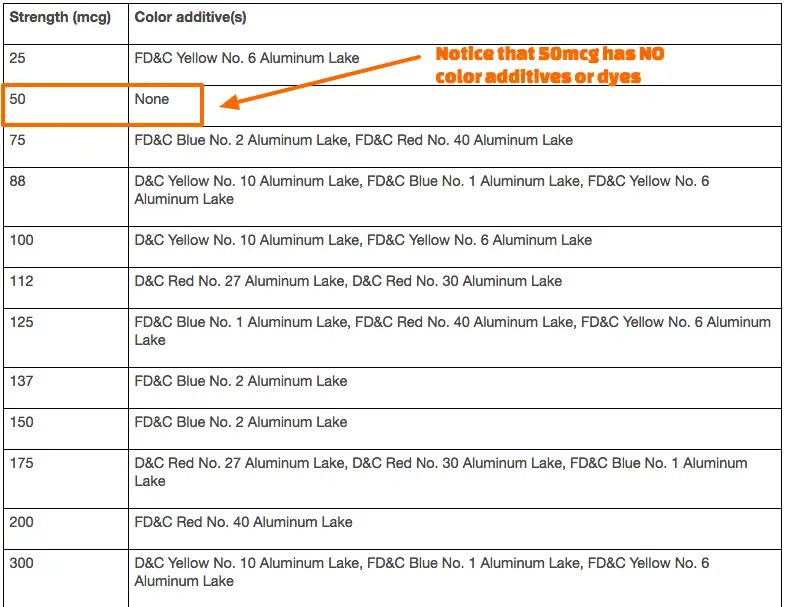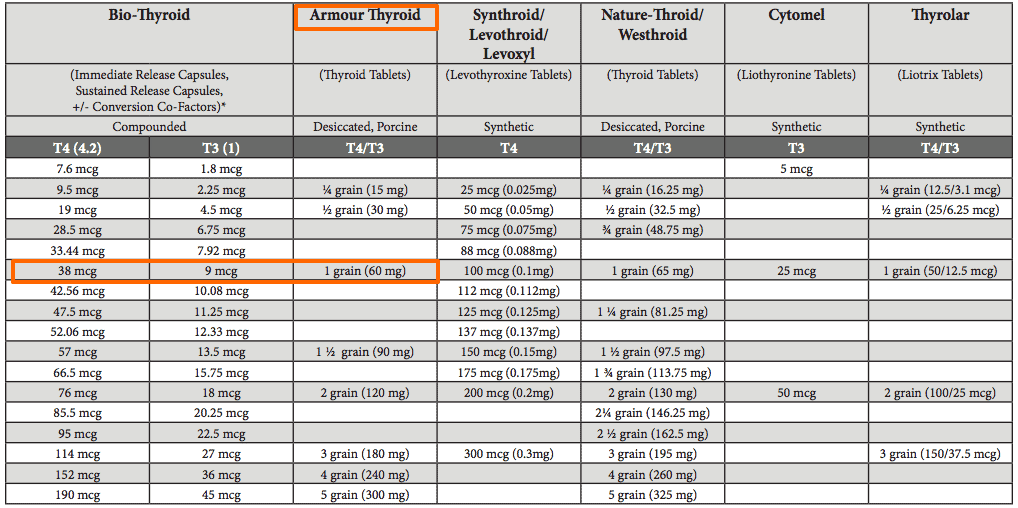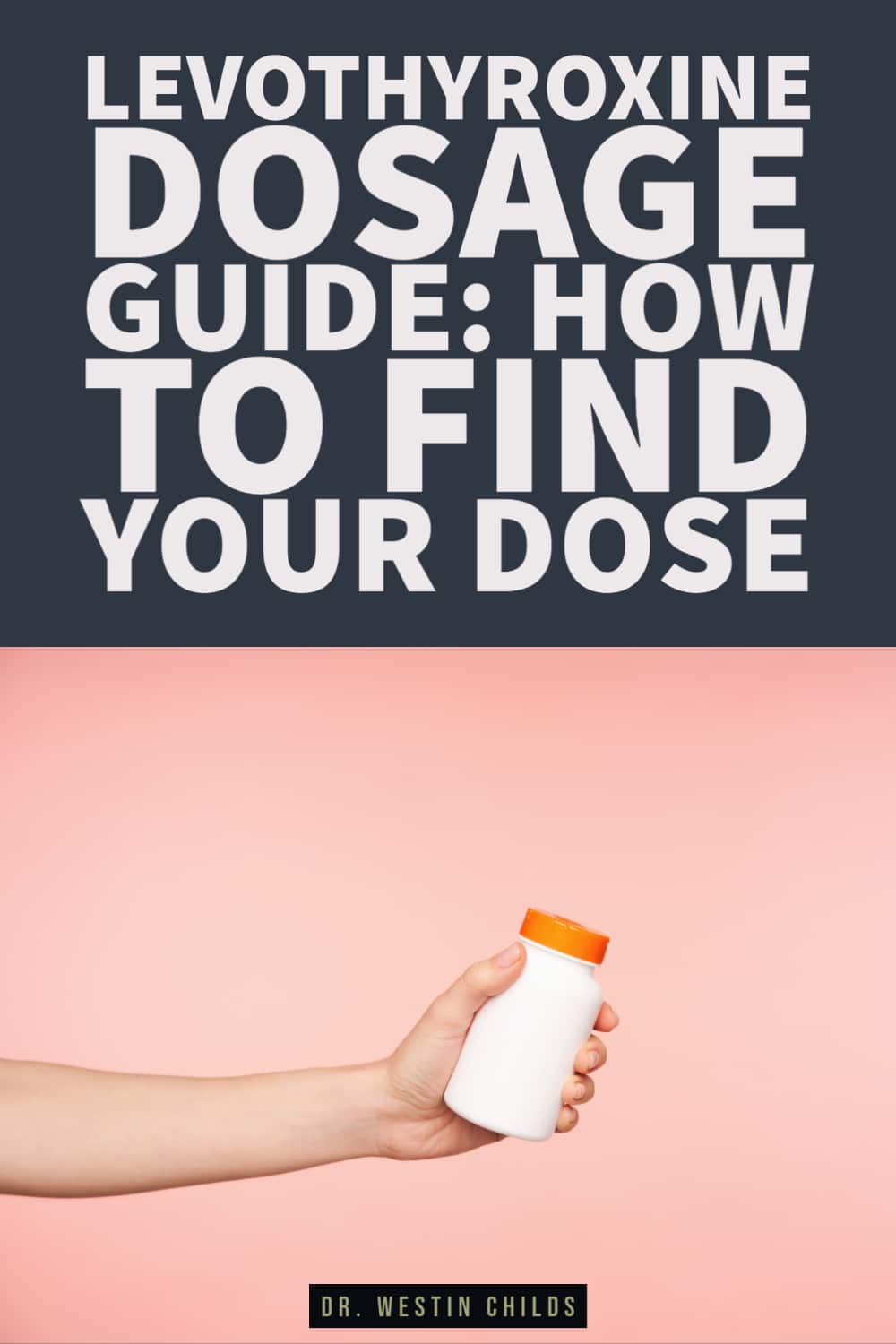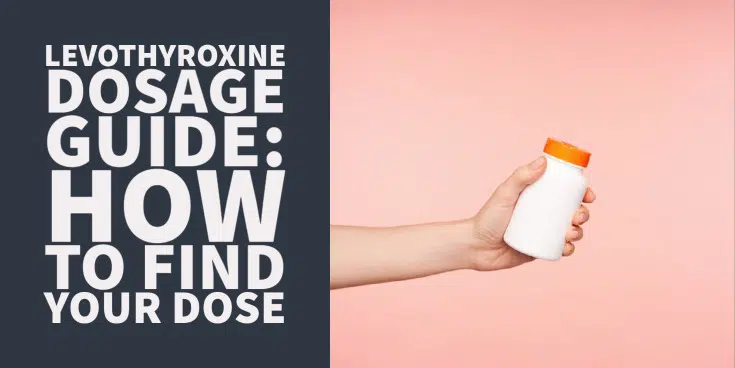Are you on the right Dosage of Levothyroxine for YOUR body?
If you are on Levothyroxine and NOT feeling better, then one or more of these things might be happening to you:
- You are not on a high enough dose
- You are on the WRONG type of T4 thyroid medication
- You are not absorbing thyroid hormone correctly
- You are not getting enough T3 thyroid hormone
But the main question is:
How do you know which category you fall into?
That’s where I come in…
Sit back and enjoy this article because we are going to dive in and talk about everything you need to know about Levothyroxine and how to find the right dose for your body:
Are you on Levothyroxine and Still Experiencing Hypothyroid Symptoms?
It’s never normal for you to experience hypothyroid symptoms despite taking your thyroid medication.
But, what exactly is Levothyroxine?
Levothyroxine is a form of thyroid hormone replacement medication and it is the most common medication used to treat hypothyroidism (low thyroid function).
This thyroid medication contains the inactive thyroid hormone T4 (also known as LT4 and Thyroxine).
If you are taking this medication to treat your sluggish thyroid, but still experiencing symptoms, then there may be a problem with your dose.
What do I mean by symptoms?
The symptoms of hypothyroidism include any or all of the following:
- Fatigue or exhaustion even after sleeping 8+ hours at night
- Weight gain or weight loss resistance (no matter how much you exercise or how little you eat)
- Depression, anxiety, or mood swings
- Problems with PMS, menstrual cycle, or low sex drive
- Chronic pain in the muscles and joints
- Cold extremities (hands and feet)
- Chronic constipation
These are the symptoms I am referring to whenever I mention the symptoms of hypothyroidism and these symptoms should be going away or reducing if you are taking thyroid medication such as levothyroxine or Synthroid.
In many cases, it’s not uncommon for patients to experience persistent symptoms of hypothyroidism despite using thyroid hormone medication.
But why is this?
This very problem exists as a result of how thyroid disease is managed.
The management of thyroid dysfunction is based largely in part on focusing on one single lab test known as the TSH.
This approach is fraught with problems and doesn’t allow for the variability required to treat each patient as an individual (2), but more on this later.
If you are frustrated with your current medical condition, frustrated with how you are feeling, or just plain confused about what is going on in your body, then this is the post for you.
We are going to discuss how you can start feeling better and how you can properly adjust your dose of Levothyroxine to start feeling like “yourself” again.
DOWNLOAD FREE RESOURCES
Foods to Avoid if you Have Thyroid Problems:
I’ve found that these 10 foods cause the most problems for thyroid patients. Learn which foods you should avoid if you have thyroid disease of any type.
The Complete List of Thyroid Lab tests:
The list includes optimal ranges, normal ranges, and the complete list of tests you need to diagnose and manage thyroid disease correctly!
How to Determine if your T4 Dose is Sufficient for Your Body
Each one of you has a different demand for thyroid hormone in your body.
And the demand for thyroid hormone depends on multiple factors including how much stress we are under, how much inflammation we are suffering from, the type of medications we are using, and so on.
Each of these will alter the amount of thyroid hormone that is necessary for our body and will, therefore, influence how much medication we need.
These factors must be taken into account when evaluating the dose of thyroid hormone that you will need.
So why do we treat every patient with thyroid disease in the exact same way?
Does it make intuitive sense that an 80-year-old patient would need the same amount of thyroid hormone as a younger individual in their 20s or 30s?
The answer is obviously no, but this is exactly how your Doctor was trained to treat thyroid dysfunction.
Unfortunately, most Doctors base all of their treatment recommendations, including the dosage of thyroid hormone on one single lab test known as the TSH.
TSH, which stands for thyroid stimulating hormone, is a marker secreted from your brain (the pituitary gland).
A High TSH is usually associated with hypothyroidism and poor thyroid function.
Most Doctors base both diagnosis and treatment on this value.
But the problem is that newer studies are emerging that show that the pituitary TSH level is not a satisfactory mirror representation of thyroid hormone status in the body (3).
In addition, other factors, including the activity of deiodinase enzymes (4), may be more biologically active in certain individuals.
These studies finally shed light on what patients have been saying for a long time and why they are so unhappy with current thyroid treatment guidelines.
While this may sound confusing, don’t let it be, because the moral of the story is this:
You can’t create a one-size-fits-all treatment plan for all patients with thyroid dysfunction because each person is unique and may require a different dose and type of thyroid medication.
This sounds perfectly logical when we talk about it like this, but, for some reason, this logic doesn’t extend to all physicians and practitioners.
So how do you find your dose?
The best way to determine your “ideal” dose is to combine several different factors together to help paint a clear clinical picture of what is happening in your body.
These 3 steps will help you get started:
#1. Check Your Metabolism
Your Thyroid gland helps control your metabolism (5) (about 60% of it anyway) and can be used as a surrogate marker for thyroid function.
The lower your thyroid function the lower your metabolism will be.
This effect stems from how thyroid hormone (especially T3) influences the mitochondria in your body which influence how much energy you will burn at rest (6).
If you struggle with hypothyroidism you may have noticed that it is difficult to lose weight.
Weight loss resistance stems from a lower-than-normal metabolism and may be part of the reason you can’t lose weight.
So, if thyroid hormone is involved in regulating your metabolism, doesn’t it make sense that taking thyroid medication should improve your metabolism?
The answer is a resounding YES!
Following this logic, then, it makes sense to check your metabolism as you take thyroid medication to determine if it is working, right?
But the question is:
How do you do it?
A quick and easy way to test your metabolism is to check what is known as your basal body temperature each morning.
Your basal body temperature is a reflection of how much energy or heat you are producing at any given time and this can be used, indirectly, as a crude measure of metabolism (7).
But, let me be clear:
It’s not a perfect way to assess your metabolism and there may be other factors that influence your body temperature including your cycle and even certain medications.
But it’s better than nothing and it’s relatively cheap and easy to test which makes it worth looking into.
All you need is a thermometer and a pen and paper by your bed to measure it each morning.
The best way to check your basal body temperature is first thing in the morning right after you wake up.
As you take thyroid hormone your body temperature should increase over time, but it may take up to 1-2 months to notice the difference.

Some studies have shown that despite using Levothyroxine (8) (and suppressing the TSH) that resting energy expenditure (a measure of metabolic function) does not “normalize” to healthy adult levels.
If you find that this is happening to you, then it may be an indication that you either need to alter your dose or consider altering which medication you are taking.
#2. Follow Your labs (Including Free Thyroid Hormones)
While the TSH may not be the most valuable lab test to evaluate your thyroid that doesn’t mean that other lab tests don’t have value.
In fact, it is just the opposite.
When you are treating your thyroid with medication you should periodically evaluate your free thyroid hormone levels.
You can do this by ordering Free T3, Free T4, and Total T3 (9).
These lab tests provide a window into your body and can help you determine if your dose is sufficient.
The hallmark of hypothyroidism is a reduction in Free T4 and an elevation in TSH (typically, but not always the case).
As you take Levothyroxine your Free T4 should increase.
Why?
Because Levothyroxine contains the same thyroid hormone that your body produces naturally.
If you are taking thyroid medication and you only see a drop in your TSH without a simultaneous rise in your free T4, then your medication dose may not be sufficient.
It’s critical that your body has sufficient Free T4 levels because it uses T4 to create T3 through the conversion process.
Low levels of T4 may result in decreased T3 and further issues down the road.
It may seem obvious to you that it’s necessary to look at the free hormone concentration in your body, but it’s not always obvious to Doctors.
But it should be, especially if you think about it.
When we evaluate all other hormones in our bodies we always look for the direct hormone concentration in the bloodstream (10).
Hypothyroidism is the only hormonal condition in which we evaluate the pituitary marker instead of the free thyroid hormone.
Take for instance testosterone:
If you have low testosterone and you take testosterone medication, doesn’t it make sense to check your testosterone levels to see if they have improved?
It makes perfect sense and that’s exactly what your Doctor should be doing.
#3. Monitor Your Symptoms
Another tool you can use to determine if your dose is sufficient is how you are feeling otherwise known as your clinical symptoms.
The symptoms of hypothyroidism occur as a result of decreased circulating thyroid hormone in the cells of your body.
Symptoms such as hair loss, fatigue, weight gain, depression, and constipation all occur directly because of low thyroid hormone.
What does this mean for you?
It means that as you replace this lost hormone these symptoms should subside and completely go away over time.
In this way, you can utilize them as a very useful marker to determine if your dose is sufficient.

Your symptoms represent another crude way you can monitor your dose and they should correlate directly with your lab tests and your basal body temperature.
It’s important to realize, though, that there may be some overlap in some of your symptoms with other medical conditions.
For instance:
Fatigue is a very non-specific symptom that can be associated with many medical conditions (11).
The same is true for constipation and hair loss.
But when you put all of these symptoms together (the more you have the more likely you can be sure they are caused by your thyroid) and you are experiencing all of them you can be more certain they are related to your thyroid and not to some other medical condition.
By evaluating all three of these important factors you can easily monitor your “success” and determine if your dose of thyroid hormone is adequate for your body.
As you go through the motion, you may realize that the amount of thyroid hormone that you need is different from other people.
That’s okay and it is to be expected.
Levothyroxine VS Armour Thyroid VS Liothyronine
As you probably know there are several different types of thyroid hormone medications that are currently available.
Unfortunately, most Doctors give out the same medication: Levothyroxine or Synthroid.
Both of these medications contain the inactive thyroid hormone T4 and in order for it to be active in your body, it must be converted to the active T3 thyroid hormone (this process is known as T4 to T3 conversion).
So why haven’t you ever heard of this before?
Doctors operate under the assumption that all patients convert T4 to T3 at an equal rate which means that they don’t feel this conversion process should be taken into account.
But there is one problem with this philosophy:
It’s not true. In fact, up to 15% of people have been shown, due to their genetics, to have a problem with this conversion process (12).
As a result, many patients are taking the wrong type of medication which may explain why they don’t feel well and aren’t experiencing any improvement.
And that’s where the other thyroid medications come in…
Many patients do very well using combination thyroid medications that contain both T4 and T3, not just T4 medication alone.
And I’m not just saying this from experience, most patients also agree that medications containing T3 are superior…

In clinical studies, many patients prefer natural desiccated thyroid hormone (13) (thyroid hormone that contains T3) over T4 medication alone.
The study shown above highlights why this is the case.
As patients switch from taking LT4 medication to thyroid extract they tend to experience a better quality of life and more weight loss.
This is felt to be secondary to the increase in free T3 and free T4 levels which can remain low even if the TSH is considered to be normal (14).
I’ve personally also found this to be the case in my practice as I transfer patients from LT4 medications over to NDT and T3 thyroid medications.
The patients who make the switch tend to experience more energy, less hair loss, more weight loss, and so on.
What to do if you have Hypothyroid Symptoms on Levothyroxine
So what should you do if you are taking levothyroxine or another T4 medication and your body temp is low, your heart rate is low and you are still symptomatic?
The good news is that there are several tips and tricks you can follow to make your current dose more effective (even if you can’t switch medications entirely).
When it comes to Levothyroxine, this medication is actually quite difficult for your body to absorb and this may account for a significant number of problems when taking it (15).
So, even if you are taking your thyroid medication faithfully, it doesn’t matter unless you are also absorbing it in your gastrointestinal tract.
There are several steps you can take to improve the absorption of Levothyroxine which may have an effect on how you feel.
At best you absorb about 80% of the thyroid hormone that you ingest (16).
But this number rapidly reduces in the setting of GI-related problems, inflammation, low stomach acid, and other intestinal issues.
Anyone who is suffering from constipation, gas/bloating, acid reflux, diarrhea, abdominal pain, gastric ulcers, low stomach acid, etc. may have reduced absorption of their medication.
This is complicated further by other medications and supplements which may reduce thyroid hormone absorption if not taken at the correct time.
So let’s talk about how you can impact the absorption component and get more “bang” for your buck so to speak.
#1. Levothyroxine 50mcg tablet
The 50mcg tablet of Levothyroxine may be better absorbed and assimilated compared to other doses.
Why?
Because each dose of levothyroxine contains different colors, dyes, fillers, and otherwise inactive ingredients.
These fillers may act to cause symptoms by themselves (17) (which can be confused with hypothyroid symptoms), but they also reduce the absorption and effectiveness of thyroid hormone in your body.
The 50mcg tablet of Levothyroxine is special in that it is white and contains the fewest amount of fillers and additives when compared to the other dosages.

This presents a unique opportunity where you can switch your current dose of Levothyroxine to 50mcg increments to potentially benefit from this.
Let’s say you are currently taking 150mcg of Levothyroxine.
You could easily switch to taking 3 of the 50mcg tablets of Levothyroxine which would be the same equivalent dose and get rid of all of the fillers/dyes in the process.
Make sense?
Something as simple as this change can actually improve how you are feeling.
Even better is that most physicians won’t have a problem with switching your dose.
#2. Consider switching to Tirosint
What is Tirosint?
Tirosint is another T4-only thyroid medication.
It’s special because it has the fewest inactive ingredients out of all thyroid medications.
It contains 3 inactive ingredients and 1 active ingredient (thyroid hormone/Thyroxine).
This makes Tirosint very easy to absorb and utilize by your body (18).
Many patients have reported an improvement in their symptoms simply from switching from Levothyroxine/Synthroid (generic/brand versions) to Tirosint.
The good news is that Tirosint is another T4-only thyroid medication which means that your physician shouldn’t put up much resistance if you ask for a trial.
When switching from other T4 medications to Tirosint it’s important to remember that even though both medications contain T4 they may not be bioequivalent.
What this means is that your body may be able to more actively utilize one form of thyroid medication over another, even though they both technically contain the same ingredients.
This phenomenon has been seen in patients switching from the brand name Synthroid to generic levothyroxine as well.
So how do you switch from your current medication to Tirosint?
The best way is to simply swap straight over as if your doses were equivalent but be sure to keep an eye on your lab tests and your symptoms to see how your body is tolerating the change.
#3. Increasing Absorption of Thyroid Hormone + When to Take Your Thyroid Medication
If you are unable to switch to 50mcg increments of levothyroxine or if your provider isn’t willing to switch you to Tirosint there are still other steps you can take to improve absorption.
The first is to simply change the time of day that you take your thyroid medication.
Studies have shown that taking your thyroid medication at night can actually increase serum thyroid levels (19).
This is most likely due to the speed of your GI tract at various times of the day.
In the morning your GI tract is sped up which may limit the absorption of thyroid hormone.
At night your GI tract slows down which may allow for higher absorption.
In addition, your cortisol levels peak at 8 am in the morning (when most patients take thyroid hormone) which may also influence thyroid hormone metabolism.
It’s certainly worth a discussion with your current physician to determine if taking Levothyroxine at night may help you.
The second option is to treat any GI-related problem that may be limiting your absorption.
By addressing conditions such as low stomach acid, SIBO/SIFO (very common in hypothyroid patients), and other GI-related problems you may be able to increase thyroid hormone absorption.
Do you need T3 medication?
By now you might be asking, do I need to be on medication containing T3?
The answer really depends on you, but I can help you figure it out…
In general, patients who should consider using Natural Desiccated thyroid hormone or T3-containing medications include:
- Those who don’t feel better on T4 only containing medications even after tracking their metabolism, symptoms, and lab tests
- Those who have not lost weight on Levothyroxine or Synthroid
- Those who notice their symptoms getting WORSE despite increasing their dose of T4 medication
- Those with low serum-free thyroid hormone levels (low free T3 and low free T4)
If you fall into any of the above categories then it would be worth talking to your doctor about switching your medication to something that contains T3.
And don’t sweat it if your Doctor isn’t willing to use Natural Desiccated thyroid because he/she may be open to using Liothyronine instead.
Liothyronine or Cytomel both contain pure T3 medications and can simply be added to your current dose of Levothyroxine.
So let’s say you are taking 100mcg of T4 and you aren’t feeling well at all.
Instead of switching to 1-2 grains of NDT, you can simply add 5-10mcg of liothyronine or Cytomel to your current dose of levothyroxine.
Your regimen may look something like this:
- Levothyroxine 100mcg per day
- Liothyronine 10mcg taken twice per day for a total of 20mcg per day
This allows for roughly an 80/20 ratio of T4 to T3 which is similar to what the thyroid produces naturally.
Levothyroxine Dosage Chart and Comparison Table
So, what if your Doctor isn’t willing to change medications or you really like being on Levothyroxine?
Then make sure you are on the right dose!
Your dose should be based on the 3 step system I outlined above: Lab tests, symptoms, and your metabolism.
You can get to this dose by starting out with a low dose (around 25mcg per day) and then slowly increasing your dose and monitoring each of the steps.
From there you can check your lab tests every 6-8 weeks to follow your TSH, free T3, free t4, and reverse T3.
Dosing varies quite a bit based on the person but a typical dose may range between 25mcg and 250mcg of Levothyroxine or Synthroid per day.
If you have continued to increase your dose beyond 150mcg and haven’t noticed ANY improvement in your symptoms then that may be a sign to consider switching medications.
If your doctor still isn’t willing to try NDT or T3-containing medications then you can also try other forms of T4 with fewer fillers like Tirosint and continue increasing your dose slowly over time.
If you are switching from T4 to another medication this comparison chart may be helpful:

This chart isn’t perfect but it is a good starting place.
I find that the conversion from T4 to NDT or natural desiccated thyroid is too low (meaning you usually need more NDT to make it equivalent to the T4 dosing).
In my experience, 2 grains are closer to 100mcg of T4 than 1 grain, but it is important to start out slowly if you are switching medications because T3 can be VERY stimulating to some people.
Conclusion + Final thoughts
Believe it or not, your dose of Levothyroxine depends on multiple variables, all of which need to be considered to help reduce symptoms and help you feel better.
Remember that Levothyroxine absorption plays a big role in how you may feel.
By switching your dosage to 50mcg increments of Levothyroxine or switching to Tirosint altogether you may improve your thyroid hormones.
Another option is to consider changing the time of day that you take your thyroid medication.
Lastly, you should also consider treating any GI-related problems that may be limiting your absorption as well.
If these options fail then you might consider the addition of T3-containing thyroid medications.
To get these medications you will need the assistance of a physician who is knowledgeable about thyroid function.
Now I want to hear from you:
Are you currently taking Levothyroxine?
Do you feel that your dose is sufficient?
Have you attempted to use other thyroid medications?
What has worked for you? What hasn’t?
Leave your questions or comments below!








